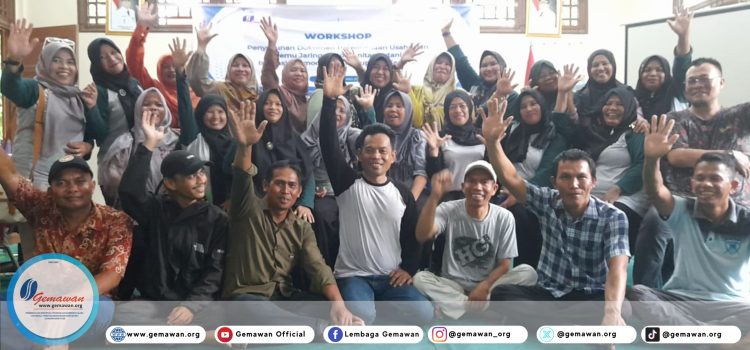
Gemawan organized a Workshop on Business Planning Document Development and Community-Based Commodity Farmer Network Gathering at the Penakalan Village Hall, Sejangkung District, Sambas Regency. The two-day event, held on May 24–25, brought together 25 participants from various villages and districts across Sambas, representing farmer communities, women farmer groups (KWT), local organizations such as Serumpun Sambas, and agricultural extension agencies.
Participants came from the districts of Sambas, Sejangkung, Tebas, Teluk Keramat, Jawai, South Jawai, Tekarang, and Galing. The activity served as a cross-regional forum for learning and collaboration, enabling farmers from diverse backgrounds to share experiences and formulate practical strategies for developing business plans based on their respective local commodities.
Opening and Institutional Support
The workshop was officially opened by Uray Endang Kusuma, a member of Gemawan’s Board of Directors.
In her remarks, she explained that Sambas Regency was one of the first regions to become a Gemawan pilot area for community assistance.
She emphasized that the main goal of the workshop was to strengthen people’s economic movements through commodity-based enterprises, using the Business Model Canvas approach.
“Today, villages have enormous opportunities through the Koperasi Merah Putih program—an initiative introduced by the President and designed to be managed directly by the villages,” she said.
“This program can help expand community business networks while enhancing local economic resilience.”
Penakalan Village Head, Sartomo, also expressed appreciation for the event. He felt honored that his village had been chosen as the host and noted that the workshop was highly relevant to current national policy developments.
“This activity opens a great opportunity for our communities to plan their businesses more systematically and with long-term orientation,”
Sartomo remarked.
He affirmed that the village government was ready to collaborate and facilitate programs that align with local needs and regulations.
Empowering Local Farmers
The enthusiasm of the participants was evident throughout the workshop.
Efendi, a farmer from Sabaran Village, South Jawai District, said that the workshop was very useful for farmers in designing both ongoing and new business plans.
He shared how rice farmers could optimize their harvest cycles—up to three times a year—with better results through strategic planning.
Imah Kusumawati, from Parit Raja Village, said the workshop broadened farmers’ perspectives on land management and productivity improvement.
“Through the Business Model Canvas, we learned how to maximize the potential of our land without converting it to other crops,”
she explained.
Meanwhile, Desi Yanti, also from Parit Raja, hoped similar programs would continue and involve more participants in the future.
“This forum not only provides theoretical knowledge but also opens a space for farmers from different regions to share experiences,”
she said.
She added that she hoped the plans formulated during the workshop would soon be implemented, both through individual and collective actions.
Towards Structured and Collaborative Farming Enterprises
This workshop marked a concrete step toward structured, collaborative, and locally driven agricultural enterprise planning.
More than just a training session, it demonstrated that when farmers are given space to learn, think critically, and collaborate, they can confidently chart their own economic futures—grounded in local wisdom and community solidarity.
Writer: Siti Rahmawati
Editor: Ersa Dwiyana
